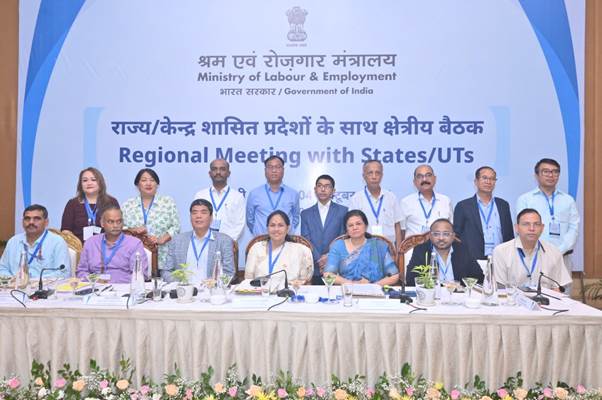Union Minister Sushri Shobha Karandlaje Inaugurates Regional Conference on Employment Generation and Labour Reforms in Guwahati
Union Minister of State for Labour & Employment, Sushri Shobha Karandlaje inaugurated the regional conference with eight North-Eastern States viz. Arunachal Pradesh, Assam, Manipur, Meghalaya, Mizoram, Nagaland, Sikkim and Tripura in Guwahati today. This is sixth regional workshop in a series of six regional meetings planned by the Ministry of Labour and Employment with States/ UTs in the spirit of cooperative federalism.
The meeting focused on discussions around labour reforms, Employment Linked Incentive (ELI) Scheme, the eShram-One Stop Solution and Building & Other Construction Workers (BoCW), quality employment generation and data sharing.
In her address, Union Minister of State for Labour & Employment, Sushri Shobha Karandlaje, emphasised the critical role of States in the successful implementation of the labour reforms, providing social security to unorganized workers, use of cess for welfare and social security to BoC Workers for social security to migrant workers. It is important to address gaps and divergence in State rules under Codes and to draw up the way forward in a collaborative manner. She encouraged all participating States to align their rules with the overall vision laid out in labour reforms.
Ms Sumita Dawra, Secretary, Ministry of Labour and Employment, while setting the context for the meeting, reiterated the importance of adopting a ‘whole of Government’ approach in reforming the labour sector. She highlighted the importance of harmonizing State/ UTs’ rules with labour codes and establishing efficient systems for capturing and sharing of data of employment generation. She also emphasized the aspect of financial literacy among employees as well as popularising Employment Linked Incentive (ELI) Scheme in States.
Ms. Dawra underscored the fact that uniformity and harmony of rules across States is vital for ease of compliance and removing any confusion and will eventually help both the employers and the employees to understand their rights and obligations clearly. There is need for greater collaboration and adoption of wider consultative approach by the States and the Central Government for implementing ongoing exercise of labour reforms, she added.
States were requested to take a proactive approach in the much-needed two-way integration process to develop eShram portal as One-Stop-Solution and timely and regularly updating employment returns. Key points for BoCW included expanding welfare coverage, ensuring audits and integrating data with eShram to enhance registration and ensuring saturation as well portability of relevant Central Government welfare schemes.
On employment generation, modernization of employment exchanges, building partnerships with educational institutions and industry collaboration were discussed. Improving ESIC services through optimal infrastructure utilization, forming State ESIC Societies, and streamlining fund flow were also emphasized. Regional offices of EPFO and ESIC to hold regular meetings with States/ UTs and employers to resolve pending issues.
Extensive interactive sessions were held among officers from the States and the Ministry of Labour & Employment, EPFO & ESIC on various States’ concerns were discussed, queries were addressed, and suggestions for future actions were noted.
Best practices from various States were also shared. Labour Secretaries from Assam and Sikkim gave demo of portal and mobile app developed respectively for BOC workers.
This meeting marks a significant step in fostering stronger ties between North-Eastern States and the Government of India, unlocking new avenues for employment generation and ensuring welfare of workers.
Mr. Alok Chandra, Senior Labour & Employment Adviser expressed gratitude to the representatives of States for their interactive participation and support provided by State Government of Assam for the successful organization of the regional meeting. Suggestions in the regional workshop lays the groundwork for future partnerships and initiatives that will benefit stakeholders.

